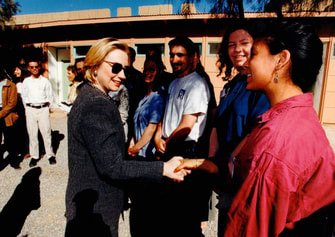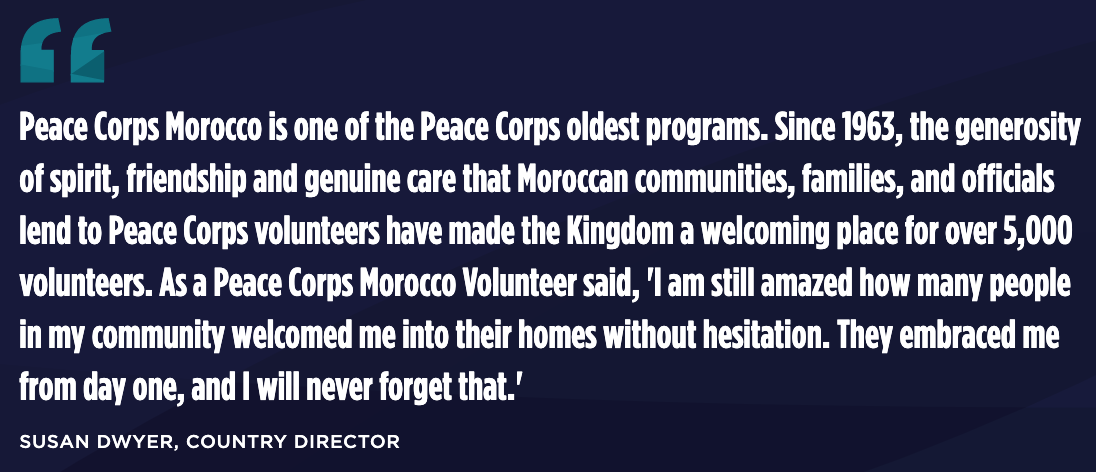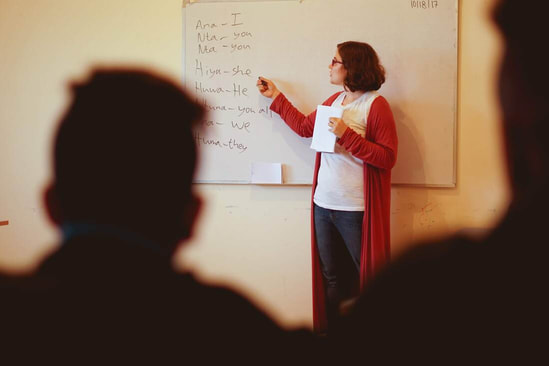History & Mission: Peace Corps
Mission
In 1961, President John F. Kennedy established the Peace Corps to promote world peace and friendship through three enduring goals:
1. To help the people of interested countries in meeting their need for trained men and women.
2. To help promote a better understanding of Americans on the part of the peoples served.
3. To help promote a better understanding of other peoples on the part of Americans.
Description
The Peace Corps traces its roots and mission to 1960, when then Senator John F. Kennedy challenged students at the University of Michigan to serve their country in the cause of peace by living and working in developing countries. From that inspiration grew an agency of the federal government devoted to world peace and friendship.
Since that time, over 220,000 Peace Corps Volunteers have served in 141 host countries to work on issues ranging from HIV/AIDS education to youth development, sustainable agriculture, and environmental preservation.
Today's Peace Corps is more vital than ever, working in emerging and essential areas such as women's economic empowerment, and contributing to the President's Malaria and Feed the Future Initiatives. Peace Corps Volunteers continue to help countless individuals who want to build a better life for themselves, their children, and their communities.
Visit the Peace Corps website or Peace Corps on Facebook for more news and information.
In 1961, President John F. Kennedy established the Peace Corps to promote world peace and friendship through three enduring goals:
1. To help the people of interested countries in meeting their need for trained men and women.
2. To help promote a better understanding of Americans on the part of the peoples served.
3. To help promote a better understanding of other peoples on the part of Americans.
Description
The Peace Corps traces its roots and mission to 1960, when then Senator John F. Kennedy challenged students at the University of Michigan to serve their country in the cause of peace by living and working in developing countries. From that inspiration grew an agency of the federal government devoted to world peace and friendship.
Since that time, over 220,000 Peace Corps Volunteers have served in 141 host countries to work on issues ranging from HIV/AIDS education to youth development, sustainable agriculture, and environmental preservation.
Today's Peace Corps is more vital than ever, working in emerging and essential areas such as women's economic empowerment, and contributing to the President's Malaria and Feed the Future Initiatives. Peace Corps Volunteers continue to help countless individuals who want to build a better life for themselves, their children, and their communities.
Visit the Peace Corps website or Peace Corps on Facebook for more news and information.
History: Peace Corps Morocco
 Photo: Peace Corps Morocco Archive (1999)
Photo: Peace Corps Morocco Archive (1999)
History
Morocco was among the first countries to invite the Peace Corps to assist in its development and manpower needs. A group of 53 surveyors, English teachers and irrigation foremen first arrived in Morocco in 1963 at the invitation of the Ministry of Foreign Affairs.
From 1963 to today, over 5,000 Volunteers have served the Kingdom of Morocco in a multitude of sites, sectors, and projects. Such endeavors included laboratory technology, urban development, commercial development, education of the blind and deaf, rural water supply, small business development, beekeeping, and English training.
In 2011, Peace Corps Morocco transitioned to a single sector in which all Volunteers currently work: Youth Development (read more below). This shift also brought about a partnership with a single partner organization, the Ministry of Youth and Sports. Peace Corps first started supporting the Ministry’s youth-related programs in 1995.
Morocco was among the first countries to invite the Peace Corps to assist in its development and manpower needs. A group of 53 surveyors, English teachers and irrigation foremen first arrived in Morocco in 1963 at the invitation of the Ministry of Foreign Affairs.
From 1963 to today, over 5,000 Volunteers have served the Kingdom of Morocco in a multitude of sites, sectors, and projects. Such endeavors included laboratory technology, urban development, commercial development, education of the blind and deaf, rural water supply, small business development, beekeeping, and English training.
In 2011, Peace Corps Morocco transitioned to a single sector in which all Volunteers currently work: Youth Development (read more below). This shift also brought about a partnership with a single partner organization, the Ministry of Youth and Sports. Peace Corps first started supporting the Ministry’s youth-related programs in 1995.
Youth Development in MORocco
In Morocco, youth comprise a majority of the population but are faced with high levels of unemployment, including among those that are educated. It is thought that a combination of a lack of job opportunities and life skills are contributing to this issue.
In order to support Morocco's efforts to help youth transition to become productive, civically engaged adults, Volunteers are assigned to a youth center, women's center, school dormitory, or youth association. In these organizations, volunteer projects focus on three objectives:
1. Strengthen the life skills of youth
2. Build the capacity of youth to engage in their communities
3. Increase the ability of youth to communicate in English
Volunteers empower local youth to build life skills, become more positively engaged in their communities, and improve their communicative English skills. In addition to other classes, camps, and clubs, Volunteers work with community partners to teach English, co-facilitate service learning and larger community projects, and mentor youth. Volunteers encourage students' participation in activities centered on the environment, sports, theater, music, art, and so on.
With girls' education also being a priority for Morocco, Volunteers and their counterparts assist girls and young women in meeting their needs through education, health and fitness, and empowerment-related activities.
Ultimately, Volunteers help empower youth to improve their lives and increase the capacity of local professionals who work in youth development.
In order to support Morocco's efforts to help youth transition to become productive, civically engaged adults, Volunteers are assigned to a youth center, women's center, school dormitory, or youth association. In these organizations, volunteer projects focus on three objectives:
1. Strengthen the life skills of youth
2. Build the capacity of youth to engage in their communities
3. Increase the ability of youth to communicate in English
Volunteers empower local youth to build life skills, become more positively engaged in their communities, and improve their communicative English skills. In addition to other classes, camps, and clubs, Volunteers work with community partners to teach English, co-facilitate service learning and larger community projects, and mentor youth. Volunteers encourage students' participation in activities centered on the environment, sports, theater, music, art, and so on.
With girls' education also being a priority for Morocco, Volunteers and their counterparts assist girls and young women in meeting their needs through education, health and fitness, and empowerment-related activities.
Ultimately, Volunteers help empower youth to improve their lives and increase the capacity of local professionals who work in youth development.

